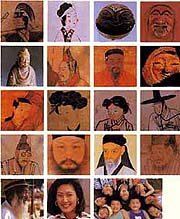...
![]() The
Koreans
The
Koreans
 The Koreans are one ethnic family speaking one language. Linguistic and
anthropological studies as well as legendary sources clearly distinguish
Koreans from the Chinese and the Japanese. Sharing distinct physical characteristics,
they are believed to be descendants of several Mongol tribes which migrated
onto the Korean Peninsula from Central Asia. Koreans were a homogeneous
people by the beginning of the Christian era. In the seventh century A.D.
they were politically unified for the first time by the Shilla Kingdom (57
B.C.-A.D. 935) and subsequently witnessed a great cultural flowering. The
Korean people struggled successfully for millennia to maintain their cultural
and political identity despite the influence of neighboring China and the
more recent aggressive inclinations of the Japanese. They are a proud people
with one of the longest national histories in the world.
The Koreans are one ethnic family speaking one language. Linguistic and
anthropological studies as well as legendary sources clearly distinguish
Koreans from the Chinese and the Japanese. Sharing distinct physical characteristics,
they are believed to be descendants of several Mongol tribes which migrated
onto the Korean Peninsula from Central Asia. Koreans were a homogeneous
people by the beginning of the Christian era. In the seventh century A.D.
they were politically unified for the first time by the Shilla Kingdom (57
B.C.-A.D. 935) and subsequently witnessed a great cultural flowering. The
Korean people struggled successfully for millennia to maintain their cultural
and political identity despite the influence of neighboring China and the
more recent aggressive inclinations of the Japanese. They are a proud people
with one of the longest national histories in the world.
The Republic of Korea had a population of 44.5 million in 1994 and registered a density of 447 persons per square kilometer. A distinct but unwelcome phenomenon is the continuing migration of rural residents to cities, resulting in heavy population concentrations. Currently, one out of every four Koreans lives in Seoul. Specialists predict that the urban population will increase to 80.6 percent in 2000, up from 74.4 percent in 1990. |